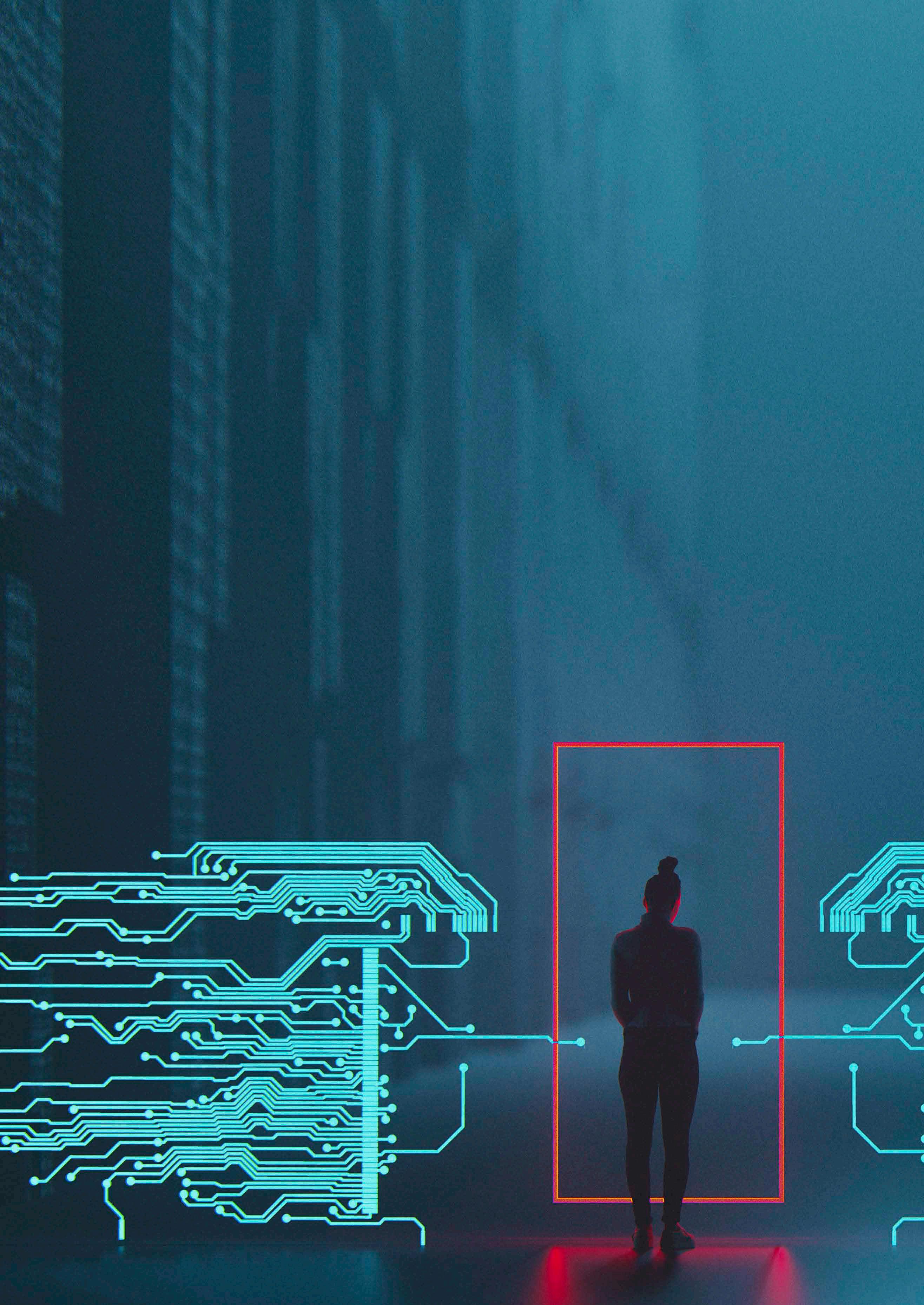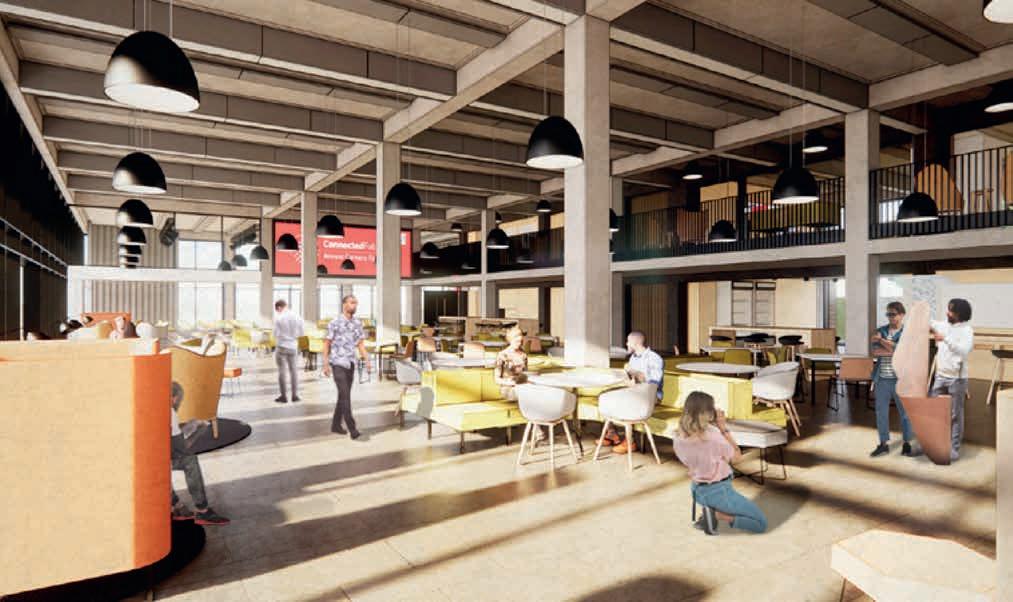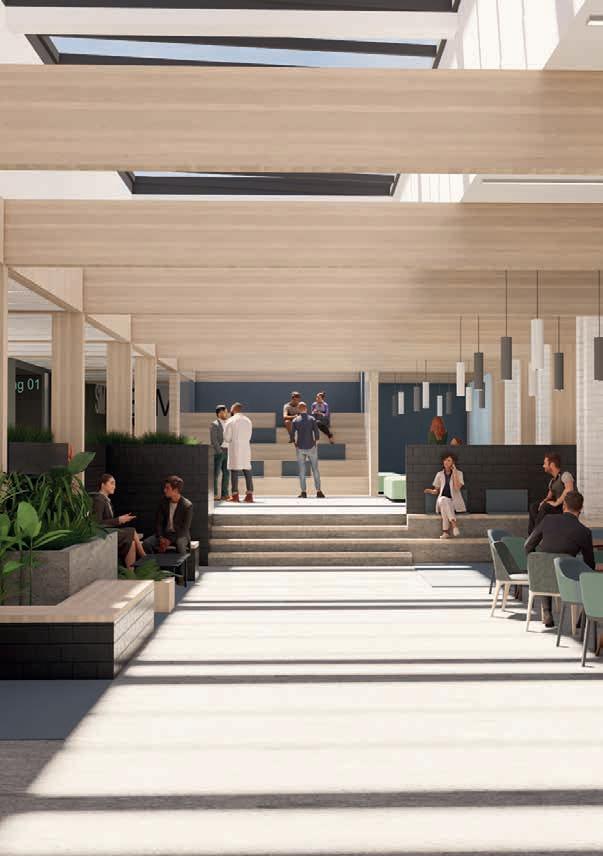
8 minute read
DIGITAL AT OUR CORE
When we hear the word ‘digital’, we tend to think of technologies at the leading edge of what is possible. Nowhere is this truer than at Staffordshire University, where we are continuously exploring, shaping and implementing new innovations to enhance the student experience.
Perhaps more surprising, however, is the fact that ‘digital’ has been part of our institution’s DNA for more than half a century. We were the first UK university to launch a computing degree in the 1960s and we have never looked back.
More recently, we became the first UK university to move to the cloud, we were the first to introduce a digital assistant for our students in the form of Beacon, and we were first to market with both undergraduate and postgraduate Esports courses. Inaugurated at the beginning of the 2019/20 academic year, the Staffordshire University London Digital Institute has further strengthened our digitally enabled Estates masterplan, representing the latest in a long list of milestones on our journey to becoming the foremost Digital University.
Whilst our Connected Curriculum places digital skills front and centre, our commitment in this area goes beyond traditional education. It would be more accurate to describe ‘digital’ as a way of life for Staffordshire University. From our day-to-day operations to our stateof-the-art facilities and everything in between, our entire organisation is underpinned and empowered by our transformative digital agenda.
DEVELOPING OUR DIGITAL WORKFORCE
During the 2019/20 academic year, Staffordshire University made considerable progress in its aim to drive efficiencies and enhance the student experience through the deployment of intelligent automation. As part of our digital transformation strategy we commenced the implementation of Blue Prism Cloud, the market-leading intelligent automation platform that will support our institution’s digital workforce.
Blue Prism’s robotic process automation (RPA) technology will enable Schools and Services from across our University community to deploy AI-powered ‘digital workers’ with the ability to automate complete process lifecycles. In addition to alleviating pressure on administrative resources by introducing self-service capability, automation will enable the rapid and around-the-clock resolution of enquiries and requests from students. In the longer term, we aim to launch courses designed for lifelong learners looking to acquire new digital skills such as automation development, for which demand is increasing rapidly. We are confident that the application of this technology to our own operations in the short and medium term will provide a strong foundation for future course delivery, contributing to our community-engagement commitments as a Civic University.

Ultimately, our digital workforce will take on highvolume transactional tasks, giving staff the time and space they need to focus on creative and inspiring activities that enhance the student experience and bring to life our University’s core values.
SUSTAINABLE INNOVATION
The benefits of a digital-first approach to higher education are manifold, extending beyond teaching and learning to the long-term sustainability of our operations. However, we understand that digital and sustainable are not synonymous. On the contrary, if the latest technologies are not implemented in a measured and informed manner, they can negatively impact an institution’s environment.
In line with Staffordshire University’s commitment to act as a guardian of its own environment and surrounding areas, sustainability remains a core consideration throughout all our digital activities, from scoping and planning through to implementation and operations.
As the first UK university to migrate to the cloud, we do not host large, energy-intensive data centres, helping us to minimise our impact on our local environment. Of course, this approach is only effective if we team up with other like-minded organisations, which is why sustainability represents a key factor when selecting suppliers.
Microsoft Azure, for example – one of our longstanding partners in the digital space – prioritises sustainability not only as a commercially advantageous focus but also as a way to give back to the communities in which it operates. Like Staffordshire University, Azure is working to achieve a series of measurable sustainability targets, including net zero deforestation from new construction, zero-waste certification by 2022, 100 percent water replenishment in water-stressed locations by 2025, and 100 percent renewable energy by 2025.
For further details of Staffordshire University’s approach to sustainability, including our commitment to become carbon net zero by 2030, turn to page 31.
DIGITALLY ENABLED DELIVERY
In line with our vision to become the foremost Digital University, the identification, development and implementation of innovations and technologies that enhance pedagogic delivery and the student experience have long since represented a priority for our institution. Whilst the global coronavirus pandemic posed many challenges for Staffordshire University during the 2019/20 academic year, it also served to expedite the deployment of digital tools to facilitate blended teaching and learning.
Firstly, we took steps to ensure that no students were disadvantaged due to access to technology, purchasing additional laptops that were loaned to students without the financial means to purchase the equipment required for remote learning. Secondly, our Digital Services team continued to invest in and implement the latest virtual platforms – powered by cloud technology – to ensure those studying more technologically demanding subjects such as Esports and Games Design could continue to engage remotely.
As well as supporting the virtual delivery of courses during our period of remote working, as well as online teaching for larger cohorts as part of our blended approach, Digital Services has also been instrumental in providing students with COVID-secure access to our outstanding range of support. Recognising the importance of ensuring continuity in support during the past 12 months, we made all Student Services available online, ensuring that our students could continue to access the guidance and assistance they needed whether on campus or remotely.

In addition to enabling Staffordshire University to maintain an excellent student experience despite all the obstacles posed by a global pandemic, we are confident the progress we have made in the digital arena during the past year has left us well placed to deliver a more flexible, resilient and engaging provision in the longer term – crisis or no crisis.
THE CATALYST
The 2019/20 academic year has seen significant progress on The Catalyst, Staffordshire University’s flagship development that will soon be supporting students, apprentices and employers from across our region and beyond.
Our £40 million apprenticeships and digital skills hub boasts a modern yet functional design, supported by an angular brick frame and featuring a total floor area of 8,800 sqm across four storeys. Whilst the building’s design is certainly striking, the potential that this cuttingedge, digitally enabled environment will offer to our University community is even more exciting. Underpinned by our transformative digital agenda, The Catalyst will pave the way for new ways of teaching and learning. Moreover, it will be used as a new blueprint for our institution’s future developments, providing flexible spaces for teaching and learning that will incorporate the latest digital technologies to enhance the user experience. The building itself also incorporates many features which make it considerably more sustainable than a traditional build. The Catalyst will become the first port of call for employers who wish to work with us, supporting our civic commitment to making it as easy as possible for external stakeholders to partner with our University. In turn, students will see increased employment-related opportunities, and our regional economy will benefit through access to this state-of-the-art, collaborative and digitally enabled facility.

Despite the ongoing challenges posed by the coronavirus pandemic, construction of The Catalyst has continued throughout the past 12 months. The building columns between the ground floor and mezzanine have now been installed and works are ongoing on the upper floors of the concrete frame. We have also worked with the main contractor to ensure that the build has brought economic benefits to the region, with a high proportion of materials sourced locally and a large number of the skilled subcontractors being drawn from the local area. The build has also supported the creation of a number of construction apprenticeships.

The next phase of the development will see the installation of the building envelope and the commencement of internal fit-out activities. The Catalyst is due to complete in autumn 2021.

RECOGNISED IN OUR SECTOR AND BEYOND

The 2019/20 academic year brought with it a flurry of awards nominations for Staffordshire University, not only within the higher education sector but also from across the broader digital landscape.
Andrew Proctor, our Pro Vice Chancellor (Digital) was awarded Chief Digital Officer of the Year at the prestigious Computing Digital Technology Leaders Award 2020. Judges described Andrew as a “truly impressive digital leader”. Andrew said “It’s an honour to be named Chief Digital Officer of the Year and it’s a very encouraging sign that Staffordshire University is making waves on the road to becoming the UK’s foremost digital University.” Following on from its official launch in September 2019, Staffordshire University London was shortlisted in the ‘Inspiring Learning Spaces’ and ‘Innovation in Teaching and Learning’ categories at this year’s Education Estates Awards where we were delighted to win the Innovation in Teaching and Learning award.
HEALTH INNOVATION CENTRE
SCHOOL OF HEALTH AND SOCIAL CARE
Staffordshire University’s Health Innovation Centre, which forms part of our plans to transform the health workforce using advanced digital technology, secured £2.89 million from the UK Government’s ‘Getting Building Fund’ in August 2020.
Located at our Centre of Excellence in Healthcare Education, Stafford, the £5.8 million project will feature sector-leading clinical simulation and immersion suites, enabling healthcare professionals and students to explore and develop new patient safety techniques within a cutting-edge digital learning environment.
In addition to facilitating simulationbased education the facility will enable the teaching of advanced digital skills, contributing to the future needs of our healthcare sector as well as our national economic recovery from the COVID-19 pandemic. Our Health Innovation Centre secured backing as part of a £23.7 million government scheme to support 11 ‘shovel-ready’ projects across Stoke-on-Trent and Staffordshire.









